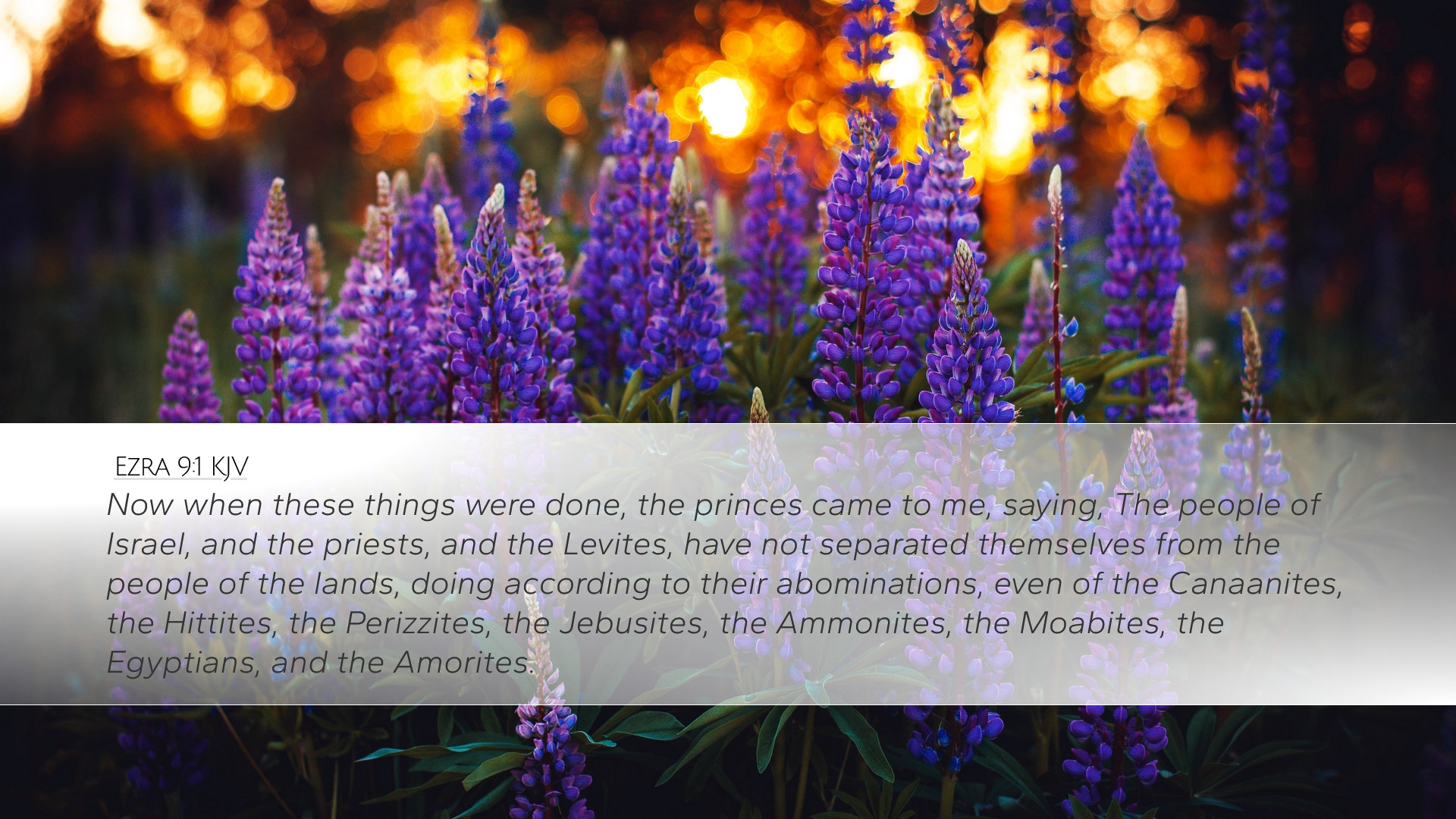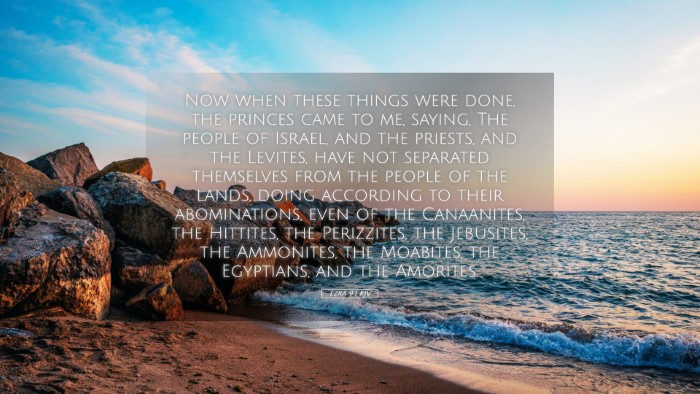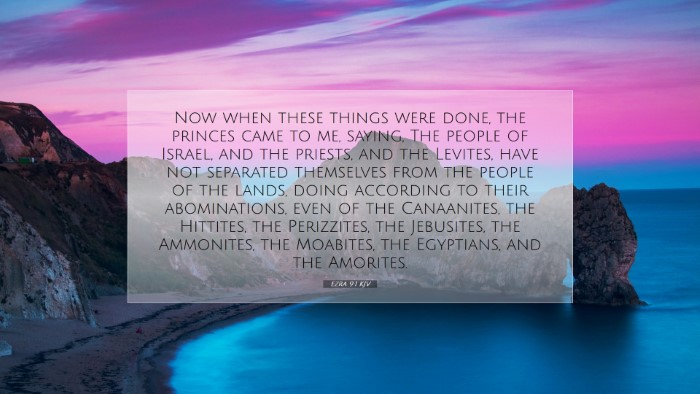Old Testament
Genesis Exodus Leviticus Numbers Deuteronomy Joshua Judges Ruth 1 Samuel 2 Samuel 1 Kings 2 Kings 1 Chronicles 2 Chronicles Ezra Nehemiah Esther Job Psalms Proverbs Ecclesiastes Song of Solomon Isaiah Jeremiah Lamentations Ezekiel Daniel Hosea Joel Amos Obadiah Jonah Micah Nahum Habakkuk Zephaniah Haggai Zechariah MalachiEzra 9:1
Ezra 9:1 KJV
Now when these things were done, the princes came to me, saying, The people of Israel, and the priests, and the Levites, have not separated themselves from the people of the lands, doing according to their abominations, even of the Canaanites, the Hittites, the Perizzites, the Jebusites, the Ammonites, the Moabites, the Egyptians, and the Amorites.
Ezra 9:1 Bible Commentary
Bible Commentary on Ezra 9:1
Ezra 9:1 reads: "Now when these things were done, the princes came to me, saying, The people of Israel, and the priests, and the Levites, have not separated themselves from the people of the lands, doing according to their abominations, even of the Canaanites, the Hittites, the Perizzites, the Jebusites, and the Ammonites, the Moabites, the Egyptians, and the Amorites."
Overview
This verse is a poignant introduction to a critical moment in the history of Israel, highlighting the spiritual and moral decline that enveloped the Jewish community after their return from exile. The heart of the concern is Israel's failure to maintain a distinct identity from the surrounding nations, particularly through cultural and religious practices that contradicted their covenant with God.
Contextual Background
The events recorded in the book of Ezra take place after the Babylonian exile, a time of restoration and rebuilding. Ezra, a priest and scribe, played a vital role in the spiritual renewal of the Jewish people. This particular chapter exposes the significant social and spiritual challenges they faced, notably intermarriage with surrounding nations and the adoption of their abominable practices.
Commentary Insights
Matthew Henry's Perspective
Matthew Henry observes that the report brought to Ezra by the princes illustrates a grave moral decline among the people. The term "abominations" denotes severe moral failings and idolatrous practices that Israel was adopting from the surrounding cultures. Henry emphasizes the seriousness of God’s covenant with Israel, which required them to be separate and holy. The intermingling with the peoples of the lands was not merely a social issue but a spiritual crisis that threatened the very essence of their identity.
Albert Barnes' Commentary
Albert Barnes provides a deeper examination of the specific nations mentioned in this verse. He explains that the Canaanites, Hittites, Ammonites, and others represent a spectrum of cultures that were historically known for their idolatrous practices. According to Barnes, the fact that Israel was engaging in relationships with these peoples was indicative of their failure to uphold God’s laws and commands. He accentuates that God's call for the Israelites to be a peculiar people (Exodus 33:16) was being grossly compromised in the face of societal pressure.
Adam Clarke's Exposition
In his detailed exposition, Adam Clarke highlights the complexity of the situation faced by the returned exiles. He notes that the leaders—who had a responsibility to guide the people—were instrumental in this decline. Clarke argues that the phrase "not separated themselves" reflects a broader spiritual laxity that allowed for the integration of foreign practices. He also points out the potential consequences of failing to adhere to God's separation, which, according to Scripture, invites judgment upon the community. Clarke's conclusion is a call to vigilance and faithfulness to God, lest Israel succumb to the same fate as before.
Theological Implications
The narrative in Ezra 9:1 speaks to ongoing themes of holiness, identity, and fidelity to God. For pastors and theologians, this passage raises questions regarding the church’s relationship with contemporary societies. The instruction to be holy as God is holy (1 Peter 1:16) resonates throughout this chapter, serving as a reminder that separation from ungodly influences is essential for spiritual health. The church must discern which cultural practices are life-affirming and which are detrimental to its mission.
Practical Applications
- Holiness in Community: The importance of maintaining a distinct Christian identity in a pluralistic society is paramount. Believers must reflect on how cultural engagement influences their faith and witness.
- Leadership Responsibility: Church leaders must be vigilant in guiding their congregations toward faithfulness to Scripture, being aware of the subtle ways that societal norms can infiltrate church practices.
- Spiritual Vigilance: The admonition given in Ezra serves as a reminder for personal and communal examination. Regularly assessing one’s practices and beliefs against the Word of God is crucial for spiritual integrity.
Conclusion
The concerns raised in Ezra 9:1 are not only historical but remain relevant today. Each generation faces the challenge of maintaining faithfulness to God amidst powerful cultural forces. As we reflect on this scripture, may we take heed of its message to preserve our identity in Christ, separate ourselves from moral decline, and actively pursue a life that honors God amidst the complexities of contemporary society.


